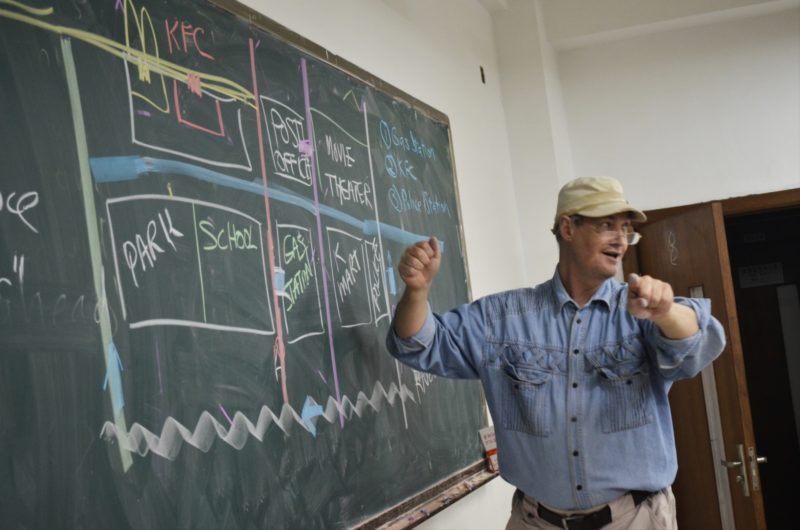
This is part of a series on intelligence and the decline of society. See this index.
In part 1 of the series, we discovered how falling intelligence results in an education system that cannot adequately educate kids. In this part, we will now look at the loss of learning that most kids experienced as a direct result of the interventions of early 2020.
Learning Loss
Not too long ago, the ACT released is 2023 results report, showing that the test scores have continued to plummet, as they have since 2020:
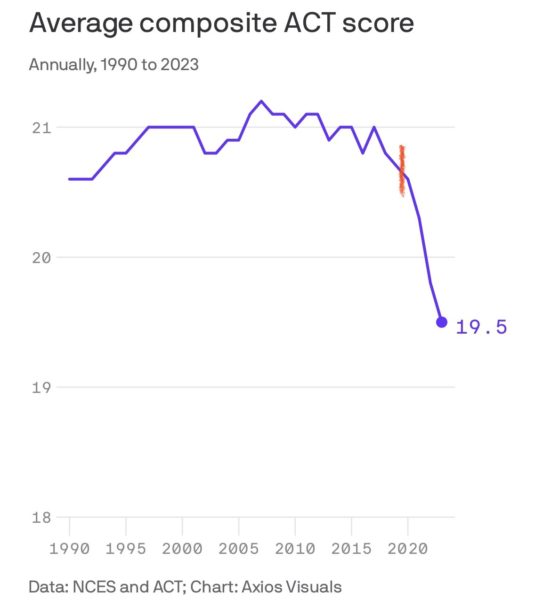
These are historic losses that began—as predicted—precisely when we shut down schools in a misguided attempt to avoid covid infections. But over on Twitter, Arijit Chakravarty is claiming that the massive learning loss that children have experienced since early 2020 was the result of cognitive damage from covid infections and not the official responses of governments and schools:
Feel free to click that photo and read the information he is citing. You can see where he says:
Covid Interventions
Many students with an IQ less than 100 (a majority of certain student groups, for example, minority children) needed to be held back a year, to repeat the previous year. But, no school curriculum changed. Students were not held back to repeat a year. Instead, they were dumped onto teachers who can barely do their jobs in ideal circumstances, let alone a school full of, now, special needs kids. What happens when you put kids into classrooms that are teaching materials that are above their abilities? They will fall further behind. Tada!
Now here is where it gets tricky. Very smart kids (IQ > 110) will be able to learn regardless of how good or bad the teachers or schools are. They may struggle for a bit, but quickly adapt to the loss of learning. But average and especially below-average kids will largely be unable to do this. So what we are going to find in future testing data is a bimodal split or a stretching out of a unimodal distribution, as the gap widens. Note that normalizing data will—by definition of what normalization is—hide this. This will make it trickier to spot, so in the next few years, look for media reports on the widening “equity gap” in school performance.
I’m going to guess that either Arijit does not have kids or he does, but they are all above-average IQ. Considering he is a biologist, mathematician, and works in pharma R&D (woah!), he is likely very smart and so are his *adaptable* children who relatively easily bounced back:
The ACT is an achievement test. Falling ACT scores indicate falling achievement. The first-order cause of falling achievement is failing to learn a topic. Long covid is, at best, a second-order effect. Kids—especially those with lower intelligence—are failing to learn because they can’t make up the gap, which only widens. It will eventually bottom out and start going back up (as younger, less damaged kids replace the older, more damaged kids who age out of the system).
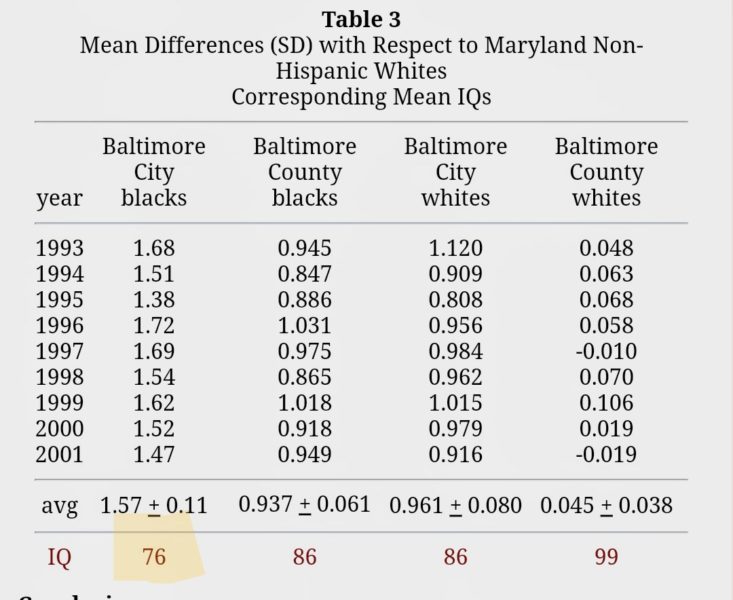
Long Covid didn’t cause entire Baltimore and Chicago schools to fail to graduate a single student student proficient in math. Extremely high per-student spending didn’t improve the situation, nor did black-only teachers. The first-order cause of poor student performance is the IQ of the students, which is very low in most inner city schools.
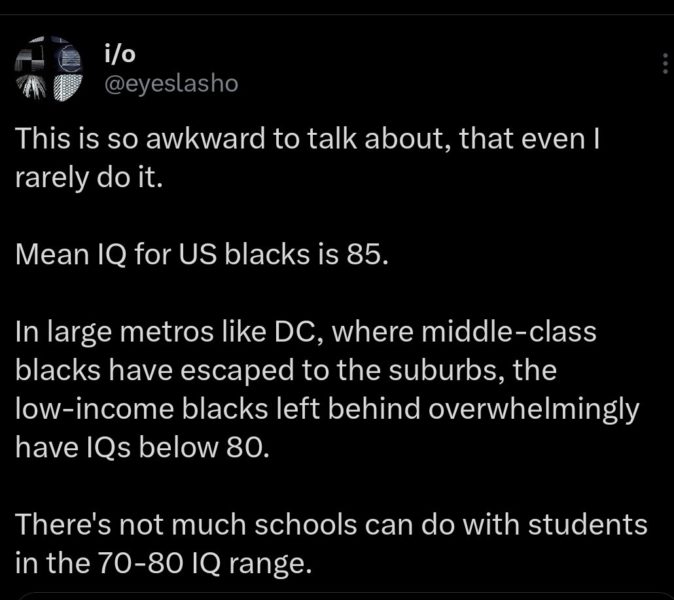
If the underqualified teachers of Chicago and Baltimore can’t fix their students, despite massive school budgets, how can other teachers fix the kids who were broken by lockdowns? It’s absurd to think that all kids—regardless of intelligence—would be resilient enough to recover from cancelled school and that going back to school would magically fix the error of closing schools in the first place. But this is what blankslatists believe.

Grades are—and have been—being inflated. Massive numbers of students should be held back a year (or two), but are not. Instead, they are all getting grades that are much higher than they should be and allowed to graduate with their higher IQ peers. But they fail the ACTs, because those can’t be faked. Knowing this full well, colleges and universities are aggressively reducing their reliance on SAT and ACT scores. This further hides the widening performance gap. The gap is hidden, not corrected, so it widens.
Covid and IQ
I didn’t expect scores to drop and then quickly recover, nor even for scores to plateau at new lows. This is true regardless of whether a child is in public, private, or a special needs school. My own experiences in each of these situations gave me some anecdotal insight into the learning process that I suspect others lack. In fact, the main reason private schools are so successful is because they select for high IQ (as we will see in part 3).
IQ and achievement scores correlate about 60-70%, so if Arijit is correct, then there will be a corresponding severe drop off on intelligence scores—which measure ability—that corresponds to the severe drop off in achievement—which measures learned skills—scores. If cognitive function is impaired due to physical damages, IQ will fall.
The problem for Arijit is that IQ isn’t falling. If anything, a quick google search shows that it is rising slightly. Students retain the same inherent ability that they had before COVID. They are falling behind on *achievement*: the system—the environment—is failing them. They are not cognitively damaged.
Brain damage would necessarily show up in IQ results, and moreover because it would affect *everyone* (not just students), its effects should be stronger in adult IQ tests because Long Covid—like Covid itself—is more damaging to adults. If IQ scores do drop, but they don’t most strongly effect adults, then something is monkeying with the results.
Arijit’s hypothesis is falsified:
- SAT/ACT scores fall, but IQ scores rise, indicating that the failure is not cognitive, but one of achievement.
- Continuing falling scores were predicted from lack of reteaching the learning lost from lack of in-person school.
The Achievement Data
Now let’s look at the achievement data itself. The NWEA reports that:
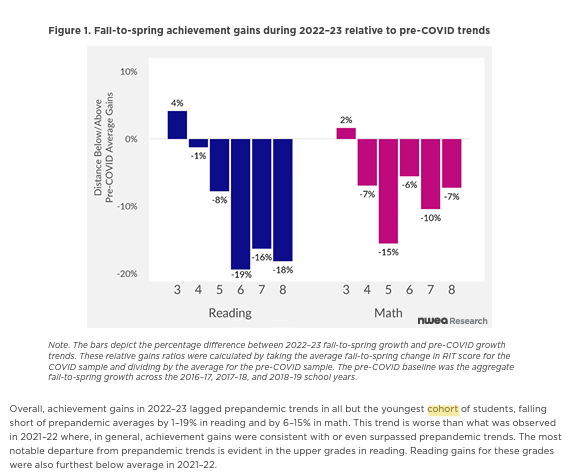
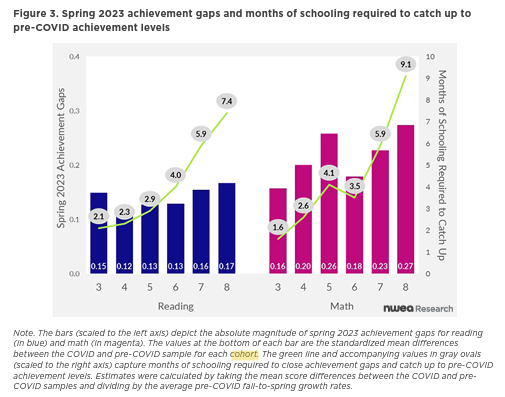
Notice that the lockdowns did not affect every cohort equally. New students are biasing the results positively, especially in reading. Notice how the older kids fell the farthest behind, as much as 9 months behind in math!
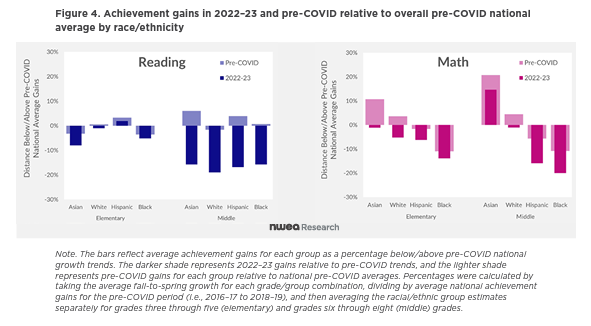
Remember above when I said that if it was caused by IQ, you’d see a widening of the achievement gap? Well, here you go. Notice that the Asian/White and Hispanic/Black gap in math has widened in correspondence with underlying population IQ.
Also, notice also how math scores (the most pure intelligence-based achievement) are exactly as predicted, but language development fell across all races, especially in the youngest cohort. Guess what also happened to stunt language development: masking and social isolation!
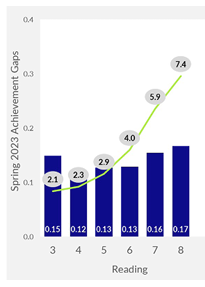
Covid infections follow illness curves, featuring multiple oscillating high and low periods, but the supposed cognitive decline caused by Long Covid is somehow completely lacking an inflection point that reflects when infections occurred over time?
The inflection point in the data was 2020, when lockdowns, masking, and social distancing occurred. Most kids did not get covid until much later with Omicron, and yet the drop-off in achievement was instantaneous with the loss of learning. There is simply no correlation with actual COVID infections in children in the ACT data. There is no reason to think that children would be, as a whole group, instantly and globally changed by covid irrespective of incidence of the disease.
In part three we will discuss some more random points in detail.



I remember in 1990, the news (ABC, NBC, CBS) had their boxers in a bundle over the latest SAT results . The tests were 10% lower than what they were in 1965 or something like that, and of course it was Reagan and Bush’s fault for “not putting education first”
By today’s metric……does that make SAT scores from 1990 “good and okay”?
A Mexican-American guy who finished high school in the mid 1990’s……..dirt poor, crime and violence in his neighborhood in El Paso. The school was “poor” and “lacking” essentials……he went on to attend Rice University, top of his class. At graduation some journalist threw a mic in his face and made the presumption “You have a lot to be proud of, I am sure you want to thank all your teachers from when you were a kid for never giving up on you! What would be your message to school boards, and State governments about funding education?”
He replied “I would like to thank my parents who didnt speak English, but wanted me and pushed me to learn, and even teach them while growing up. I would like to thank my father who taught me a work ethic. I would like to thank my mother who took on jobs so I could get extra help and tutors to help me in math and subjects my parents didnt fully understand. I am so glad my parents didnt allow me to hang with bad neighborhood kids, and thankful we had dinner every night growing up together at a table with the TV off”
And he walked away. The journalist of course looked like a robot with “error 404” glazing her eyes.
Even with average IQ kids to below average IQ kids……a stable family life at home is where education begins. The family doesnt have to belong to a “bold n biblical” church. It doesnt have to have a perfect marriage….but the stability kids need in their formative years is essential in the home for an environment conductive to learning.
I was trained to be a Special Ed / elementary school teacher. They are, and have been “baby sitters” for a very long time now. They demand and expect respect, but dont want to be certified like any other professional. Even Barbers have to pass a State Board exam.
How did we ever survive? Or get this far? Catholic school nuns teaching a class of 30 students algebra back in the 1920’s, and many from immigrant backgrounds where the parents didnt speak English in the home?
The young female teacher sent to the local country “one room” school in 1930 teaching 30 boys an girls grades K-6 with “no new text books, and benefits, and sick pay, and a living wage, and, and, and, and…….” and she is barely 22 herself.
Home life may not have been “perfect” for all these kids back then…but there was stability in the home.
Also, when I was student teaching…………….no time for actual teaching (everything was scripted from the county / state lesson plans) and only teaching to a test, and zero consequences for poor behavior. And…………..lots of paperwork!
Finally a Union that has loyalties only to a political party with a letter “D” for its affiliation
Your memory is correct. But do you know what happened after this? The SAT restructured the test to make it easier. This caused scores to artificially inflate. Scores from the 1990s (before the restructuring) are not directly comparable to modern scores, or rather a high school in the early 90s is better than that same high score today.
They hid the decline.
In the ultimate twist of irony, since altering the test to inflate the scores, the Asian/White/Hispanic/Black gap has actually increased.
Oh, so it doesnt come off like I am a genius like every other poster on the Internet or the in ‘sphere. My combined SAT when I took it in 1987 was 968
I have a slightly below average IQ. I had to study ten times harder to just get C’s in many subjects. We DO forget that a “C” grade is AVERAGE. Today, we make it out that a C means you can only work a cash register or answer a phone. and you “deserve” to be poor or have a low grade job.
My work ethic saved me more than grades, education or “leaders” that I was supposed to look up to just because they had the title, or education or supposed intellect.
Yes, I was supposed to take time off the internet…but it is the holidays. Soon, soon.
That last bit is, I think, the proverbial “rub”. Zero consequences for bad behavior.
If the teacher has no control over his/her classroom, there isn’t much learning that can happen. The environment isn’t conducive to it.
I taught science at a very VERY bad school once upon a time. It was impossible.
I’ve spoken to quite a few people who shared similar experiences. Teaching in a good school is a joy (I did that in the ROK). Teaching in a bad school is like trying to make a speech in a penitenury locked up with the inmates. I’ve heard this from even soldiers…one said (paraphrasing) “I’ve been shot, endured just about every kind of hardship, but teaching is the only thing that broke me”. I was only 23 when I gave it a try, and it was the last time I taught in a US school (though I volunteered a lot through the years with my own sons….and we made sure to live in areas with good schools when possible).
2020-2021, however, broke just about everyone I know as far as education goes. Those were lost years for our boys too (college/high school at the time).
Liz,
Your comment beat my analysis in part 3. Nice work.
Peace,
DR
Pingback: Intelligence, Education, and Covid: Part 3
Pingback: San Francisco and Schooling - Derek L. Ramsey